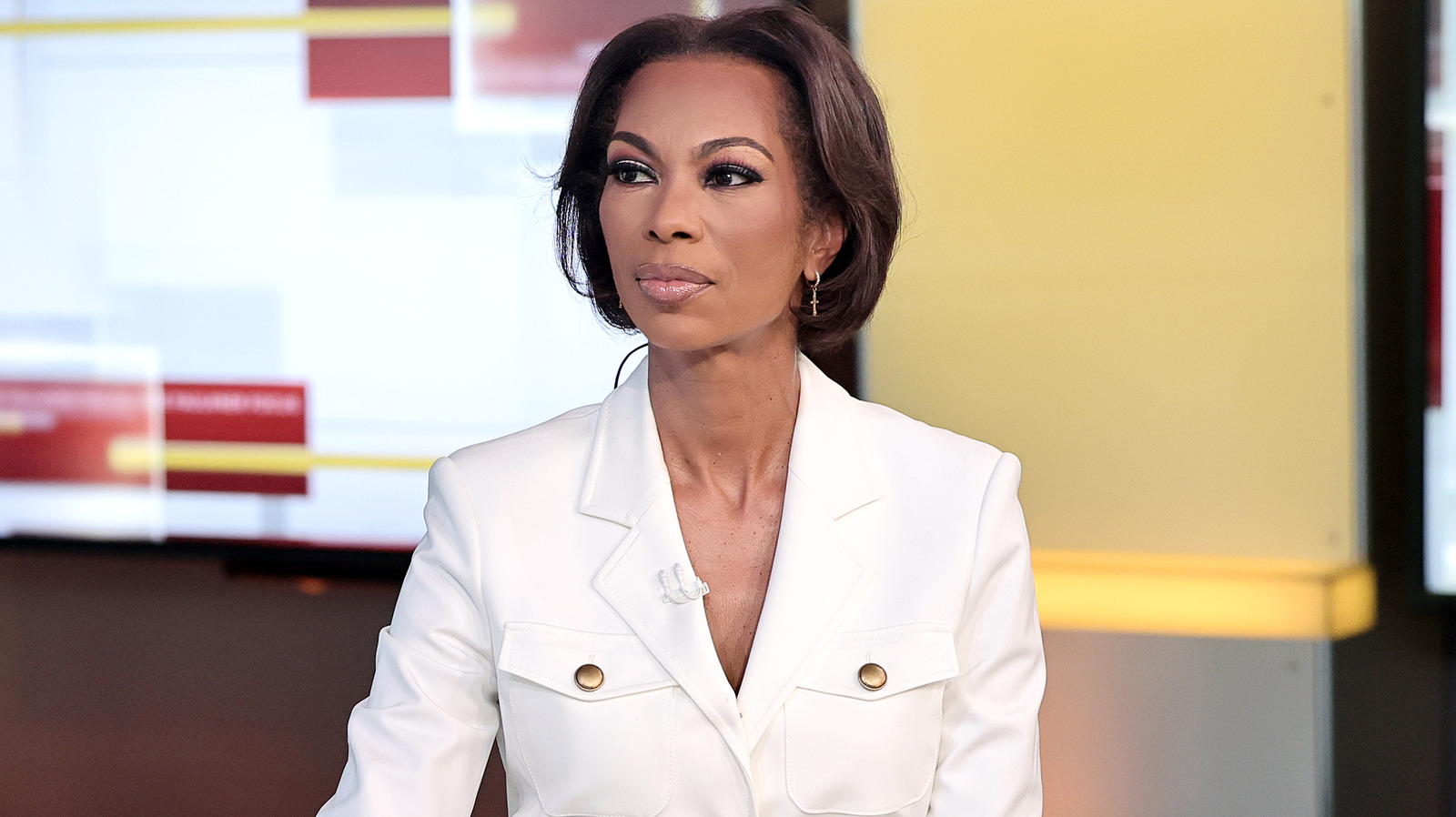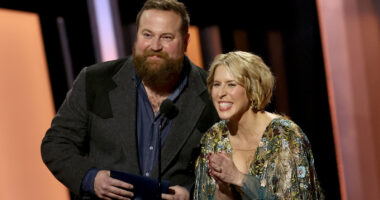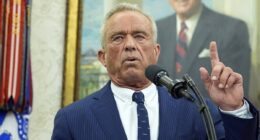We may receive a commission on purchases made from links.
Harris Faulkner has been a smiling and calming presence on television screens for almost two decades, and while her life might seem like a feel-good story, that hasn’t always been the case. The 59-year-old Emmy-winning host anchors the Fox News daytime show, “The Faulkner Focus,” and serves as co-host for their panel show, “Outnumbered.” She is married to fellow television reporter Tony Berlin, with whom she shares two daughters. As a self-professed woman of faith whose book “Faith Still Moves Mountains” was a #1 New York Times best-seller, she has become an ascendant star on the Fox News network, even interviewing former (and soon-to-be) President Donald Trump during his first administration. As for her political views, she can sum that up by telling you her pronouns are “U.S.A.”
But despite her strong personality, Faulkner has faced plenty of breaking news in the form of personal and professional tragedy. Her line of work has brought her face-to-face with terrifying and heartbreaking moments in American history, where she has found herself to be the voice of reason in an otherwise tumultuous political landscape. As an African-American woman, she has often been put in a public position to speak out on issues of racial inequality. But when faced with difficulty, it’s easy to see how Faulkner has managed to not just survive but thrive, as she told Forbes, her hard-nosed mentality, saying, “If someone tells you not to be pushy, start pushing that person out of the way.”
She processed the trauma of Sandy Hook in real time
On December 14, 2012, Harris Faulkner stood in the parking lot of Sandy Hook Elementary School in Newtown, Connecticut, and witnessed firsthand as hearses began pulling into the area where she was about to go live. In her interview with Forbes, Faulkner recounts the tragic morning of the mass shooting that killed 26 people, including 20 children. Knowing that she was in a difficult situation, Faulkner softly opened her reporting with a moment of silence, saying of the hearses, “You know why they’re showing up, let’s just take this moment together… A moment of silence.”
Her ability to know what and what not to say in the face of tragedy helped guide her and her audience through the difficult day. She recalls discussing with her colleagues whether they would report on the number of deaths and the mental toll that it took on her. In an interview with The Washington Times, she said of the day, “I have broken down [on air], and Sandy Hook was hard. I think because I’m used to that feeling of kind of all eyes on me as I tell a story, I’m okay with people seeing the truth about me. As long as they know I’m going to tell them the truth.”
She stood up for George Floyd against Donald Trump
In 2020, when Donald Trump was interviewed by Harris Faulkner for Fox News, the conversation turned to the Black Lives Matter protests that were sparked by George Floyd’s death at the hands of former police officer and convicted murderer Derek Chauvin. In the interview, Faulkner told Trump that his response to the incident was different from that of a person of color’s response, and when recalling the moment to Forbes, Faulkner recalled herself saying, “When George Floyd called out on the last few breaths of his life for his mom —his Black mother — he called my name, Mr. President. He called my name. I’m Mom first.”
Correcting Trump in an interview is no simple task, but in speaking to Forbes, Faulkner recalls it as less combative and more human, saying it felt like “two people sitting on a log, simply talking.” But in terms of seeing herself and her people in the tragedy of Floyd’s death, Faulkner said of her conversation with Trump, “Sometimes it calls for the humanity and the humanness of the moment to come forward. You don’t have to interject and be bold with opinion or whatever, but you do need to let people see who you are.” And at the end of the day, Faulkner looked back on the moment with pride, saying, “This is why I said what I said. We got a better interview, because we both came at it from different perspectives.”
She weathered co-host Melissa Francis’ tears when discussing race
In what may be the oldest trick in the book when you find yourself on the losing side of an argument, Harris Faulkner weathered “Outnumbered” co-host Melissa Francis’ tears when the group of five commentators apparently talked about race a little too much. As the only black woman, though, she was joined by Juan Williams as a fellow person of color, Faulkner listened as her co-hosts debated whether or not Donald Trump said there were “very fine” people amongst a group of Neo-Nazi protesters. But when Francis continued to defend Trump’s assertions, she began to cry, making for an all-time awkward live television moment (though Faulkner has had her own share of awkward teleprompter-related incidents).
In the segment on Fox News, Francis first says, “I am so uncomfortable having this conversation,” and then begins to tear up and say, “I know what’s in my heart, and I know that I don’t think anyone is different, better, or worse without being judged!” Despite the dire and timely circumstances surrounding the need for a national news organization to talk about race-related issues in a substantive way, Faulkner’s co-host instincts were quick to kick in before the entire studio melted into a tragic puddle of awkward soup. Sliding in with the perfect segway, she said, “You know Melissa, there have been a lot of tears on our network and across the country and around the world,” only to then expertly hold Francis accountable by closing with a gentle but obvious piece of truth, stating, “This is not 1950, we can do this. We can have this conversation, oh yes, we can, and it’s ok if we cry having it.”
She lost her father who she called her North Star
During the already difficult COVID-19 pandemic in 2020, Harris Faulkner lost her father, Bobby Harris, on Christmas Day. He had been widowed after losing his wife, Faulkner’s mother, in 2016, which left Faulkner without parents for the remaining holiday season. Faulkner posted a message saying, “Always guiding me through his grace and strength, Dad will now do so from heaven, beside my mother. I am theirs and they are mine, forever.”
As evidence of their close-knit bond — and one of many bits of information most people don’t know about Faulkner – is that she actually chose to use her father’s last name (Harris) as her first name when she was young, later choosing the surname “Faulkner” from a distant family member. Her father was a military veteran, aptly born on Flag Day, with Faulkner sharing on Instagram that their patriotic family creed was, “Praise God; Love America and all Americans, especially when we don’t agree; Do all you can for those who can offer you nothing more than their company.” She also paid her respects on X, formerly known as Twitter, saying, “My dad Ret. Lt. Col. Bobby R. Harris has died. I shall remain silent for a bit, while our family’s Christmas North Star takes his place in heaven.”
Her father’s death shook her faith
Harris Faulkner is a devout Christian, and her faith is the basis for her bestselling book “Faith Still Moves Mountains,” but even her mountain-moving faith was tested after her father passed away. She told the Christian Post, “I struggled mightily with my own faith journey during the height of the COVID-19 pandemic, when my dad passed away on Christmas morning in 2020.” She attributed the lockdowns that came with the pandemic as contributing factors for drifting away from her beliefs, saying that she “began to pray less and cry more in my loss. It was a ridiculous recipe for someone who was raised by parents who taught the opposite.”
But when Faulkner found an annotated Bible that belonged to her father while packing up his apartment after his death, his own words on the page rekindled her faith. She said that it “came complete with handwritten notations about scriptures that he loved. I began to read his interpretations and expressions of faith.” The direct connection with her late father helped her heal, with Faulkner saying, “The more I prayed and read his Bible notes, it felt like pieces in my life, however broken, were being knitted back together.” And just like the perfect segue out of a news story, so Faulkner found triumph in tragedy.










